|
Of all the nuggets in the world, these nuggets will forever hold a place in my heart. Thursday marked the last day of school and of my time as a teacher in Hawaii. Working with these students has taught me not only how to be a teacher, but how to be a friend, a role model, how to multitask like a boss and to love unconditionally. These students and I went through a roller coaster of a year together and we learned and grew from each other so much.
On numerous occasions I have been asked about what I do and when I say that I'm a teacher, I get mixed responses. Often times from parents I get the "wow that must be rough, good on you" and from old friends who are my age I get the "oh, cool" response reflecting the old adage of "those who can't do, teach". But I am so much more than a teacher. Through lessons and discussions I have taught my students about tolerance, appreciation, empathy, and other important social skills. I have been a shoulder to cry on and a lunch buddy for students who needed someone to talk to, or to not get involved with playground drama. I have prepared my students for their future, exposing them to that their path options are for their lives, and that everyone's path is different, and that's okay. While every lesson that I taught may not have always been "common core aligned" or "truly transformational" for their education, I always made sure that they understood why what we were doing was important. If we were practicing brainstorming or discussion skills, I told them about how I would have to brainstorm as an adult, or work in a group setting with colleagues, and how that leads to a productive lifestyle. These experiences have helped to shape who I am as a teacher, and also as a professional. I have learned that I love being in the classroom with my students, but I also love helping expose them to the world. Access to opportunity is something that Teach For America pushes as one of their key ways to help students grow. This idea has resonated with me the most throughout these years. Moving forward I would love to continue my work with students in whatever way possible, working to better their communities or their lives. I'm not sure where my journey will take me but I'm excited to see what possibilities lie ahead.
1 Comment
Fifth Grade Registration Day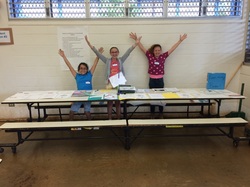 This quarter we had registration day for incoming fifth grade students and their parents to experience Wheeler Middle School and the classes that they will be taking next year. When I first heard about this, the first thing that came to mind was "wouldn't it be cool if we had some student involvement as well?" I swiftly set about to get current students who could act as older buddies of sorts to help the incoming students with any questions or concerns that they may have. Three of my most proactive students stepped up to the plate to help out. They brought samples of things that they had done in sixth grade to show the fifth grade students and parents, and then when the incoming fifth graders were wandering around the campus to register for classes, these students were walking around helping answer questions and directing them. Another team in sixth grade got together five students of their own, so we ended up having 8 current students walking around, answering questions, and helping out. Next year when I do this I am aiming to have a stronger presence of current students, and more parents as well, to help with the process, it really did seem to make a huge difference. Socratic Seminars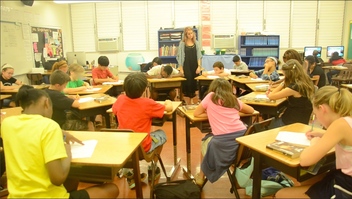 Something that I have been trying to incorporate more into my classroom this quarter was Socratic Seminars. I found these to be especially useful in terms of developing my students' critical thinking and critical questioning skills. I took a much more scaffolded approach to it and modified the process a little to meet the needs of my students. At the beginning of the process we spent the first few weeks just practicing questioning skills; questioning texts, questioning each other, the books we were independently reading, the novel we were reading as a class, news articles, anything that we could question we would. We also broke our questions down into DOK (depth of knowledge) 1, 2, 3 levels to understand our questioning. The students got really good at creating and distinguishing between different types of questions. From the questioning strategies we moved to answering. What I was noticing in my first few rounds of attempts at socratic seminars was that their questioning strategies were really good, but they weren't able to take the discussions further than simple responses. This prompted me to work on having large questions, with time to answer, then discussions of the answers, with purposeful grouping of students who had distinctive differences in opinions to responses. This process of a modified Socratic Seminar helped move the students in the direction of understanding how to question and respond, and I have confidence that they will be able to get much better moving forward. SBA Preparation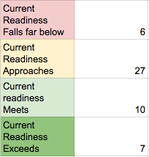 Using the TeenBiz data tracker I have been able to see how my students are performing on tasks and activities aligned to advancing their critical thinking skills and lexile scores. According to the data, of my 50 kids, 6 are fall below being ready, of those 6, 3 are new students and as such don't have as much data, which could be skewing the results. The 27 students that are in the approaches range, are students that I feel I can really work with to make sure that they are prepared. We have been working on critical thinking and engagement strategies such as the Stanford Read Like a Historian lesson plans, Socratic Seminars and discussions, practice SBAC performance tasks, and essay writing. One of the things that I am most worried about is that a lot of my students are slow typers. It makes sense that if you can't type quickly, you may be able to think quick enough to answer a question, but if you can't type as fast as your thoughts, it will be more difficult to finish on time. I have every confidence in my students' abilities to do the work, but the timing is what I am most nervous about. Going into Fourth Quarter
Let me tell you this, after getting used to having numerous weeks with at least one day off, this quarter has been a challenge. In addition to putting our curriculum together with four different 6th grade teachers doing four different things, we are working on preparing our students for the SBA standardized test that they will be taking in fourth quarter. This whole quarter I've sort of felt like I've been sprinting to catch up with a bullet train that won't slow down for me. It is helpful to have a novel to focus my attention on, and to center my lessons around, and my JHU classes are proving to be useful in giving me ideas, but the different teachers doing different things, therefore resulting in a lessened opportunity to collaborate, has been very stressful. It does however make things interesting for me and the part of myself where I really like to challenge myself. I know that by the end of this, I should be a lot stronger in creating curriculum and lessons because I have to figure it out for myself. Something that I have been really excited about lately is that I am trying to make my class more student-driven. This quarter, especially for this book, we have been focusing on discussions and discussion skills. Watching my students develop their personalities and etiquette procedures for discussions based off of what works for each class, and watching them develop their abilities to create questions and hold discussions, has been inspiring. This whole year I have been trying to be the person who leads their discussions but I have found that often they take them in good places if I can provide the right guidance and supporting documents.
I guess it's probably a good thing that I haven't had a lot of time to blog on here? The keiki have been keeping me pretty busy on this roller coaster ride that is first year teaching at a new school. We have gone through so much together so far, from establishing classroom norms and how to treat others to, "guys, come on, you know what you need to be doing right now" to silent classes (days when I only speak to them through powerpoints because my voice is failing me or they need to calm down), to silent 10 second dance parties, to spontaneous walk and talks when I could tell that they needed to get out of their seats; this semester so far has been a learning experience that I have to say I am really enjoying. One quote that is really affecting my teaching practice right now goes something like "for 17 years we tell our kids to sit down, shut up, and then pick a career" I feel like even in my very narrow, very limited professional development that I have been going through, there has to be more to education then producing obedient children. TFA puts a lot of emphasis on teaching us how to engage our students and to make them better humans but I want to know also how to get them to be more engaged. Middle schoolers especially need to interact, need to walk, to move, to be engaged, but why is it so hard to do that? Why am I so scared to have them do group work? Is it because I can't monitor them? Because I don't know exactly what they are doing? Yes and yes, but why should that be a problem. I am scared to do more group work and partner work because I feel that my students haven't gotten to the point where they realize why we are doing what we are doing and what effect it has on their learning. One of my big focuses this year has been on student ownership of learning and I feel that while I have gotten them to that point individually, when I put them in a group or partner setting, they begin to lose that and are more concerned with who did what at recess and why. I will expand on this more later but this is where I'm at so far. I, like many of my fellow first year TFA corps members, am already planning for next year and thinking about what I can do to make my class more engaging: I know that I need to set up my classroom culture even more from the beginning. My team teacher and I (I teach the kids ELA/SS and she teaches them Math/ Science) put a lot of emphasis on setting up the procedures and rules that I let classroom culture fall by the wayside. My kids know how to enter silently, sit silently, work at a noise level 0 or 1, take out and put away laptops, raise their hands, but they don't know how to positively affirm others, why they shouldn't speak over their classmates, why they shouldn't talk out of turn, what being respectful looks like. They know what obedience looks like but they don't know why they need to be doing it, or what effect it has on our classroom culture.
At the end of the day, it really is all for the keiki.
Ms. Singlehurst reporting!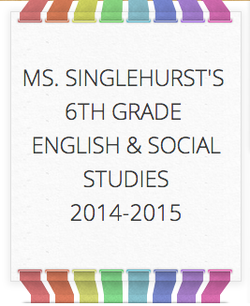 Click that pic over there to check out my website for my 6th grade class! You can see the newsletters that I am sending to parents, my homeworks for the weeks, my resources etc. Also once I start to get some projects up and running with my kiddos then you will be able to see projects there too! Sorry I haven't been documenting what I've been up to, it's a Hurricane Day today and I'm finally getting a WHO 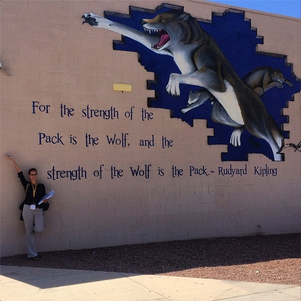 This week has been one of the most interesting, stressful, intense, high learning curve experiences of my life. This week I have woken up at 4:30 AM every day, and been in bed around 10:30-11:30, I haven't done that in a very long time, and honestly, I don't mind it all that much. This week was spent teaching things to some 400 incoming corps members that people who got an education degree learned in 2-4 years. We learned how to set classroom norms, how to make a lesson plan, how to make a lesson plan vision, how to find activities, how to make activities, how to be culturally responsive, how to work with IEPs and students that need modified coursework, how to give assessments, make assessments, find assessments, and so much more. In a week. I am coming into this next week with a week's worth of lesson plans that I am going to be teaching to 20 students for an hour a day, on how to read and reading strategies. One thing that I find pretty cool about what I'm doing is that I did cover a little bit of it in my second language teaching class at the University of Hawaii at Manoa. We learned about lesson plans, SLOs (student learning objectives), and how to find and create activities; the best part about that is that I was one of the less stressed corps members this week. I get to go through this week and teach incoming sophomores strategies on picking an independent reading book that is on their level, how to preread and make predictions, how to monitor comprehension, and how to make questions that clarify information and lead to successful discussions. I'm starting to feel like a teacher. I haven't had much one on one time yet with my students but oh man will I have that tomorrow. 65 minutes with students, the third block in their 4 hour long class, will be interesting. Although I am only with these students for four weeks, and although I will probably never see them again, and although this experiences is just as much of a learning process for me as it is for them, I already think that they are amazing students and I am really excited to see them accomplish their growth goals. I'll fill you in on how my activities have gone and what I've been doing later once I figure out what I've done myself! Graduation time!So, I have officially graduated from the University of Hawaii at Manoa. My grades are in, my transcripts are (hopefully) being finalized with that little *received her degree* at the bottom, and my diplomas will be in the mail soon enough (I got one in Hawaiian and one in English because why not).
It's been an interesting journey these past few years. If you had told me in high school that I was going to end up back at UH after four years, in the perfect department for what my interests were, instead of at some snow capped, brick-layed, fountain-having, campus in the pacific north west, I would have called you crazy. But in the end, it's funny how things turn out. Even while I was at Western Washington University, I wanted to be a linguistics and French double major because I wanted to teach english or teach French abroad, or something to do with language education. It just so happens that fate would put me back at UH where their second language studies program is amongst the best in the nation (makes sense as we have A LOT of international students). I'm proud to say that I finally got a 4.0 semester, last semester I go ta 3.95 but that's water under the bridge, and will hopefully be graduating magna cum laude. Side note, if you had told my deans in high school that I would graduate magna cum laude from a University with a double major, they might have called you crazy too. All in all though, I'm just thankful. I'm thankful for the support of my parents, my advisors, my teachers, my friends, my brother, everyone who's been there with me this whole way. And I am ready to start the next leg of my journey with Teach For America teaching at Wheeler Middle School!! As a French major, and a lover of history and the world, I always felt that it is important to travel the world and to see how others experience life. This past summer, for the month of July, 2013, I spent five weeks in France, exploring the country, speaking the language, and immersing myself in its culture. It is important to be exposed to other cultures to better understand how others live, because it is through those types of experiences that you can gain insight into how the world functions as a whole. Being in France was an amazing experience for me to see, in real life, how everything I've learned in my French courses for the past 8 years manifest themselves in reality. I have put together below a slide show for your viewing to see some of the cultural experiences I had in France. C'est fini!As the semester is winding down and I am turning in all of my projects and final papers, I have finished my independent study report! If anyone is interested in reading a paper about second language acquisition from an individual's point of view, in an immersive setting, you might find this interesting. 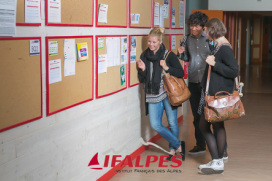 ® IFALPES ® IFALPES I spent this past summer, as mentioned in my About Me section, studying French language at the Institut Français Des Alpes, or IFALPES, in Annecy, France. This program was a five-week intensive study where I spent three hours a day doing nothing but speaking and learning French alongside students from all over the world. I had students in my class from Russia, China, Brazil, Colorado (exotic, no?), Spain, even Venezuela. We all went through this process of language acquisition together, with a variety of language levels and a variety of reasons for being there. I was fortunate to have gone there as an SLS student; this means that I have done some research, and been educated to some degree on the process of language instruction and language acquisition. Prior to my departure for Paris, and ultimately Annecy, France, I had spoken to my advisor, Priscilla Faucette, about doing a potential independent study project or 499. We decided that for this paper, I would go to IFALPES as a student of SLS, interested in what accepted methods were efficient or inefficient in my personal language acquisition process in a foreign language classroom. In addition to my time spent in the language classroom, I was also exposed to a more natural level of speech from my home-stay family. I was placed with an amazing family outside of Annecy, in Annecy-le-vieux, which is more or less the suburb of Annecy, with whom I could freely and comfortably talk. I was fortunate enough that my host mother had a thirteen-year-old daughter who was semi-proficient in English, and could therefore understand me when I was searching for a word, and could help explain if her mom couldn't fully understand where I was going. During this process, and all of my interactions, I spent time noting what I was doing to further my language acquisition, what worked, what didn't work, and I began to speculate as to why. During my classes, I would jot down notes in the side margins about what the teacher was doing at that point in the lesson that I found useful or what I didn't find useful. I also made notes in the journal about experiences with my host family that were useful, interesting things I encountered in the real world, maybe with shopkeepers or sales people, and what was efficient and inefficient in those situations. Since I have been home, I have been working on this paper, and having weekly meetings with my advisor to discuss my progress. I am now in the twelfth week of developing my paper, and am well on my way to a paper that I can, and will be, very proud of. I am starting this blog entry to give you a reference to what it is that I have been working on and why it is important to me and to my academic portfolio. I have attached below a copy of my proposal which was made before my departure to France, that can be used as a reference to my final paper to show what I was looking to get out of the paper, and what I did accomplish. When I have completed my paper you will be able to find it by clicking here. That's all I have for now!
|
About Chelsea
Chelsea received her Bachelor of Arts degree from the University of Hawaii at Manoa in the Department of Second Language Studies, and the Department of Language and Literatures of Europe and the Americas, studying French Language. Archives
May 2016
Categories
All
|
||||||||||||
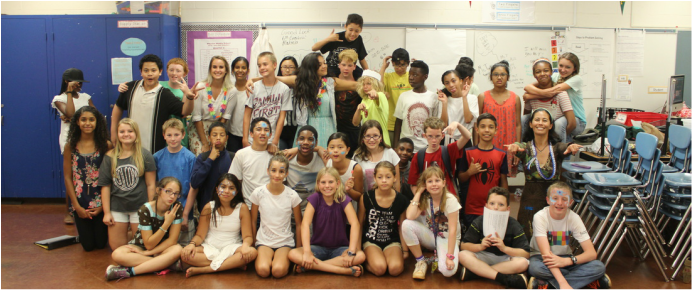
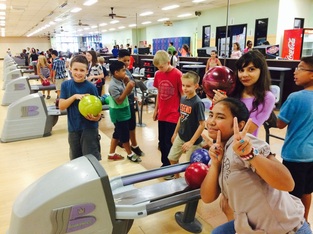
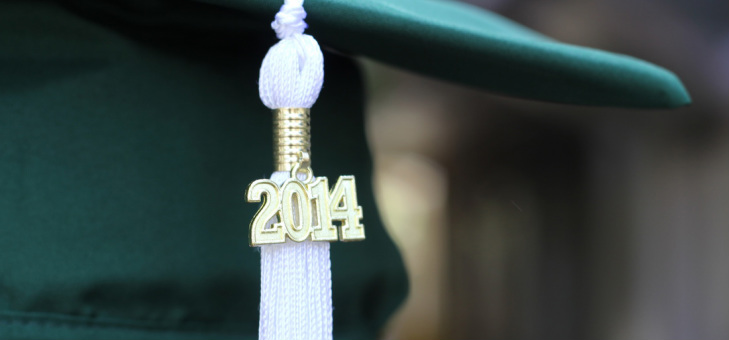
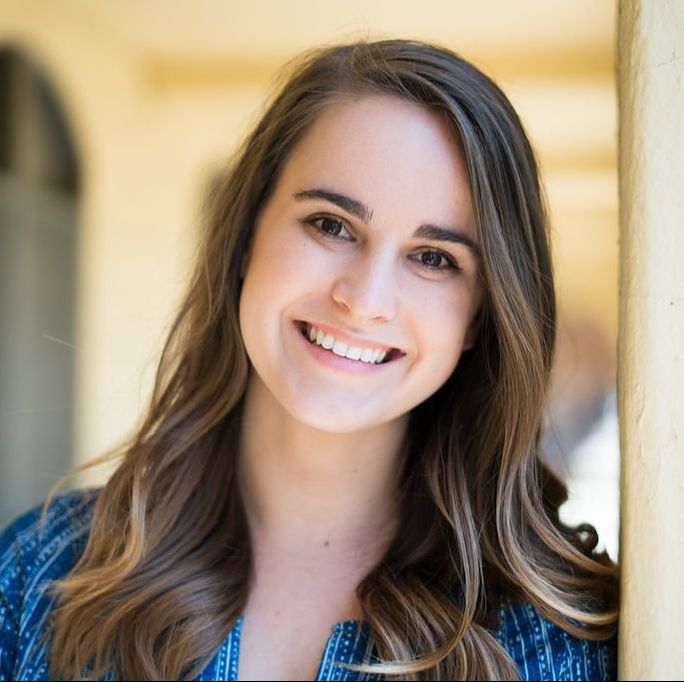
 RSS Feed
RSS Feed